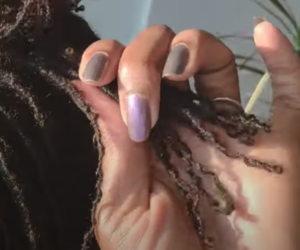I’ve had my Sisterlocs for 19 months and I thought it would be a good time for a short hair update. It’s been one week since my first professional reti (since February) and my Sisterlocks are settling in nicely. Overall, I would say that I have low to medium density hair.
I am happy with my Sisterlocks but I have noticed that the ends are thin in the front section, compared to the rest of the locs. And it’s more noticeable if you look from root to tip.
I know the reason, and the reason is because when I took down my first set of Sisterlocks, I combed them out and the ends were all ravaged. When I compare the Sisterlocks at the back of my hair where I had the undercut, the ends are thicker now and they are showing signs of budding and locking, whereas the thin ends of the front section are still curly and not showing any signs of budding or locking, as far as I can tell.
I’ll have to keep a watchful eye on them to see what happens.
Breakfast foods
Today I have 5 simple breakfast ideas featuring foods that encourage hair strength and growth. Some of these are new to me and I’m looking forward to how it works out – and to hearing your thoughts.
I’m vegan – and so all the breakfast ideas are plant-based, but feel free to add to them according to what you prefer to eat!
- Berry juice
This contains strawberries and raspberries. Strawberries have a very high vitamin C content. 1 cup of strawberries contains a whopping 97% (to over 100%, depending on the information source) of our daily vitamin C needs.
>> The benefits of vitamin C
- Produces collagen – a protein that strengthens hair & prevents it from becoming brittle and breaking.
- Helps the body to absorb iron from what we eat – low iron levels may cause anaemia, which is linked to hair loss.
** A severe lack of vitamin C can lead to a condition called scurvy which is characterised by pinpoint bleeding around the hair follicles and ‘corkscrew hairs’ on the body.
The juice I’m making today includes:
- strawberries (1 cup), as strawberries pack a vitamin C punch!
- raspberries ½ cup
- 1 banana and
- 1 cup of oat milk (or any milk of your choice)
I’m using soft, fresh berries, and I’ll blend and strain them to get rid of all the bits. It’s sweet and delicious thanks to the natural fructose – fruit sugar from all the fruit Alternatively you could just eat them!
Next: spinach two ways:
If you prefer to have something warm and savoury try this:
2. Spinach toast
Here you can see all the ingredients for the spinach toast:
1 cup of spinach
2 tablespoons of flour
Half a cup of sweetcorn
Dried chillies to taste
Grated nutmeg to tast and
1 cup of oat milk (or a milk of your choice)
>> Spinach – the benefits
Spinach is a healthy green vegetable that is a great plant-based source of iron – and iron is essential for hair growth
Also contains: folate (an essential micronutrient), vitamin A (helps, with sebum production to moisturise scalp and hair and helps to prevent hair loss), vitamin E (can help to prevent hair loss) and vitamin C (vital for the absorbtion of iron – without iron, we can experience hair loss or hair not growing past a certain length)
3. Spinach & green salad
Yes salad for breakfast! – Why not?
I like to mix it in with other salad leaves e.g. green, red leaf, butter salad leaves, to give it more taste.
And add a home-made dressing of olive oil, lemon juice and maple syrup.
4. Teff porridge
I’m going to use teff to make a porridge but what is teff?
- Teff is an edible seed from a plant called Eragrostis tef , also known as Williams lovegrass or annual bunch grass.
- It has a been a core part of Ethiopian cooking for thousands of years.
- The plant is believed to have originated in Ethiopia between 4000 and 1000 BC.
Take a look at my teff porridge.
What’s so good about teff?
- Teff is a protein-rich grain and has been called the world’s most nutritious grain (calcium, zinc, copper, magnesium, thiamine, fibre and protein).
- Teff contains very high levels of copper – and low copper levels can cause premature hair loss. Upping your copper intake can stop hair loss and premature greying.
- Teff also has a high zinc content, which has lots of benefits for the body, such as tissue healing, but zinc also helps the body to absorb copper – which benefits the hair.
- Teff is a healthy alternative to wheat and it has a rich nutty flavour that grows on you.
For the porridge – for 1 person:
- ½ cup teff
- 1 cup of oat milk (or ½ cup water and ½ cup oat milk) or other milk
- A sprinkling of pumpkin seeds – which contain vitamin c – which plays a crucial role in hair growth and also something called cucurbitin, a unique amino that may be responsible for hair growth
- Nutmeg and cinnamon to taste
- Sweeten with some honey
- 5. Oats two ways – soaked or thick with clementines
The good old staple porridge oats.
I love soaking my oats overnight – and by the morning, they are soft and tasty and refreshing served cold, straight from the fridge.
1 cup oats
Cinnamon to taste
1 teaspoon Chia seeds
1 teaspoon flaxseeds
1 cup of oat milk (or other milk)
1-2 teaspoons of maple syrup
I soak then with chia seeds or flaxseed (to ramp up the nutrients), plus nutmeg and a little maple syrup for sweetness.
The benefits
Chia seeds are an excellent plant-based source of protein – crucial for hair growth – insufficient protein can lead to slow hair growth and hair loss.
Flax seeds are a great source of omega-3 fatty acids which can moisturise, strengthen and protect hair and nourish and soothe the scalp. They’re also an excellent source of protein that prevents weak or brittle hair.
Strawberries and clementines, as we know – are both sources of vitamin C – for strengthening the hair and preventing it from being brittle.
Alternatively, just cover a cup of oats with water and microwave for 4 minutes. Add peeled clementines for sweetness.
Oats contain:
- Fibre, protein, iron and trace elements of magnesium, thiamine, folate, pantothenic acid, phosphorous, zinc and copper.
- All of these help to strengthen the scalp, support healthy hair follicles and reinforce strong strands.


